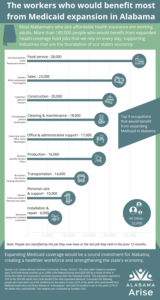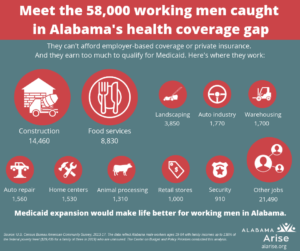Alabama can lead the nation in addressing the inequities of our past
By Robyn Hyden, executive director
The Alabama Arise annual meeting is my favorite day of the year. It’s the day we invite members to present new issue proposals and select legislative priorities. This year, more than 200 people gathered in Montgomery on Sept. 7 to discuss the tough issues facing our state, hear from community leaders and vote on our policy agenda.

Our keynote speaker, Gabrielle Daniels of the Equal Justice Initiative, set the tone in discussing racial equity and inclusion. “Alabama can set the temperature for the rest of the country,” she said. “But we need to acknowledge the importance of racial equity and its intersection with economic justice.” The vision Daniels laid out was one of “mutual flourishing” if we commit to start with truth-telling. It’s a key value that Arise affirms.

A plan to move Alabama forward
Our policy team presented plans to address core tax and budget needs, including Medicaid expansion, untaxing groceries and protecting nutrition supports. During issue presentations, member groups from across Alabama identified numerous barriers that face people living in poverty in their communities. And they proposed real solutions to those structural challenges.
After the members’ vote, we left with our marching orders and the conviction that we must continue to move forward.
We’re grateful to our hosts at Aldersgate United Methodist Church, our members and the volunteers who made the day possible. And we’re looking ahead to the work to come to make this blueprint for change a reality in Alabama.
Alabama Arise’s 2020 issue priorities
By Chris Sanders, communications director
- Adequate state budgets: Alabama should expand Medicaid and boost investments in child care, education and mental health care.
- Tax reform: Alabama should untax groceries and end the state’s deduction for federal income taxes.
- Criminal justice debt reform: Alabama should strengthen protections against civil asset forfeiture abuses and reform its cash bail practices.
- Death penalty reform: Alabama should require a unanimous jury vote before handing down a death sentence.
- Payday and title lending reform: Alabama should approve 30 Days to Pay protections for payday loan borrowers.
- Public transportation: Alabama should provide state support for the Public Transportation Trust Fund.
- Voting rights: Alabama should lift barriers to voting rights restoration and adopt automatic voter registration.
Read our news release for more information on Arise’s 2020 issue priorities.
Medicaid expansion helps Alabama workers
By Jim Carnes, policy director
It’s an uncomfortable reality that our state’s leaders must face: More than 100,000 Alabamians are working without health insurance. They work in child care, construction, food service and other vital jobs. They’re the folks who keep things going in our society.
Yet they’re trapped in the health coverage gap. They can’t afford employer-based coverage or private insurance. And they earn too much to qualify for Medicaid under Alabama’s harsh income eligibility limits. (For a parent of two children, that limit is just $312 a month.)
As a result, many struggle with health problems that sap productivity, add household stress and get worse without timely care. And thousands more Alabama workers are stretching to buy coverage they can’t afford.
Across the country, 36 states have closed their coverage gaps, but Alabama is lagging behind. What’s holding us back?
Lack of awareness plays a part. As folks go about their daily activities, they rarely stop to wonder who has health insurance and who doesn’t. It’s not something most people talk about – but it should be.
Imagine what it would mean to the state’s business community to have a workforce with access to regular health care. And more importantly, imagine the peace of mind that coverage would bring for workers and their families.
The economic benefits of Medicaid expansion
Overall, more than 180,000 Alabama workers would gain health security from Medicaid expansion. Our businesses would gain a more reliable workforce. And our economy would gain billions of federal dollars, stronger tax revenues and thousands of new health care jobs.
The graphic below shows the nine industries employing the largest number of these workers. More than 70,000 work in food service, sales or construction. (Read our blog post for more information.)

Most uninsured Alabamians aged 19 to 64 who would qualify for expanded Medicaid coverage (those earning below 138% of the federal poverty level) are workers.
The graphics below show the jobs employing the most working women and men in Alabama’s coverage gap. Think about the importance of these lines of work. Then think about what access to regular health care would mean in the lives of these workers and their families. (Read our blog post for more information.)


Alabama Medicaid has succeeded in providing health care for children, people with disabilities, and seniors living in nursing homes. Our state can build on these gains and make coverage affordable for the workers we all depend on every day.
All these gains would spell a brighter future for Alabama. It’s time to expand Medicaid and make health coverage affordable for the workers we all depend on every day.
How Alabama can untax groceries and boost education
By Carol Gundlach, policy analyst
Alabama has two intertwined structural problems that, together, keep us from meeting our people’s most basic needs. One problem is that our state’s tax system is upside down. Rich people get huge tax breaks, forcing people with low and moderate incomes to make up the difference. The other problem is that this upside-down system doesn’t raise enough money to support schools and other vital services adequately.
Two major drivers of Alabama’s regressive tax system are a sales tax on groceries that hurts working families and a skewed income tax break that overwhelmingly benefits wealthy people. Alabama Arise has a longstanding plan to address both problems: Eliminate the state grocery tax and end the state deduction for federal income taxes (FIT).
Untaxing groceries without replacing the revenue would take $480 million annually away from education, hurting our children and our future. But by ending the FIT deduction, Alabama could bring in more than $800 million a year in new revenue.
That’s more than enough to replace lost revenue from the grocery tax. It also would allow our state to invest hundreds of millions of dollars in K-12 and higher education.
Ending the grocery tax and the FIT deduction would make our state’s tax system stronger and fairer. About four in five Alabama households would get a tax cut overall. And the net tax increase for those who would pay more generally would be modest. Even for the top 1%, the average increase would be less than 1 percentage point of income.
Arise’s tax reform plan would boost education funding and help millions of Alabamians make ends meet. This would increase opportunity and shared prosperity across our state.
More photos from Arise’s 2019 annual meeting


For more pictures from the event, check out the Arise annual meeting 2019 album on our Facebook page.


